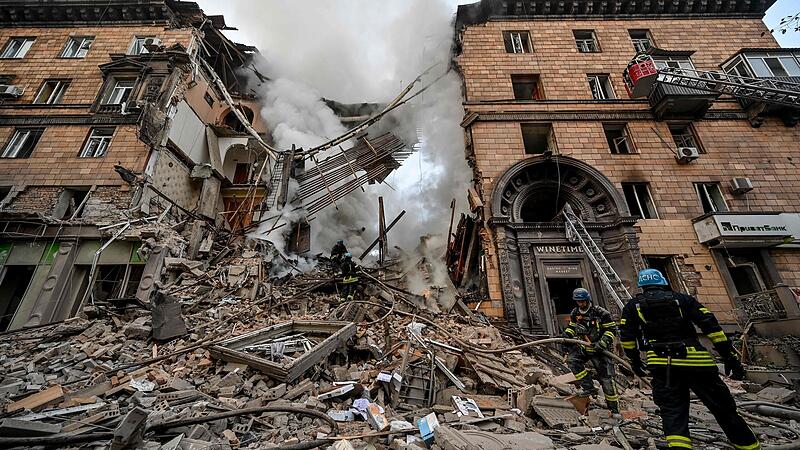Russia’s attack on Ukraine has been going on for almost nine months and there is no end in sight to the daily fighting, bombings and power failures even at the beginning of winter. Reports by the pediatrician Anna Bantovska and Sister Nataliya Vakulishyna show how young helpers on the ground are coping with the difficult everyday wartime situation. Both left their country at the beginning of the war, but returned to support the suffering population.
Bantovska works in the neonatal intensive care unit in the Odessa Children’s Hospital, Sr. Nataliya as a teacher in Kyiv. In mid-November, both came to Vienna at the invitation of “Jugend Eine Welt” and gave the Kathpress news agency insights into their experiences.
Right at the beginning of the war in February, the pediatrician Bantovska, like all doctors in Ukraine, was informed that she could now be deployed as a military doctor. Her boss was posted to a military hospital, and she herself, as a neonatologist, was allowed to remain in her previous job. Bantovska fled to Germany to escape the bombs, but soon returned to Odessa because she was urgently needed here. “We in the children’s hospital would never have believed that we would have to treat so many gunshot wounds,” says the 26-year-old doctor. Colleagues from other countries, above all from Israel, which itself had been tried for a long time at war, trained the hospital staff, online or even directly on site, and that free of charge.
Doctor – a dangerous profession in the war zone
Being a doctor is currently not only one of the most challenging but also one of the most dangerous professions in Ukraine, as hospitals and health facilities have repeatedly been the target of Russian attacks over the past eight months. The maternity ward in the eastern city of Kharkov, for example, was hit by rockets, but continues to function there by moving the delivery room and premature baby ward to the hospital basement. “C-sections have to be done very quickly and cleanly there, the rehabilitation time is short,” reports Bantovska about what her colleagues on site are saying.
In Odessa in the south-west of the country one can feel safer thanks to a functioning anti-missile defense – which has made the Black Sea metropolis a place of refuge for many refugees from regions occupied by Russia or close to the front. The result is “that we have about the same number of births as before the war,” says Bantovska. Her premature baby intensive care unit has treated around 500 babies since the beginning of the war. She sees the continued high number of births in Ukraine as a positive sign. “We all have a lot of hope. You can’t even live a single day without hope,” says the young doctor.
As far as the supply of medical products is concerned, after the “shock” of the beginning of the war there are now medicines again, “because our pharmaceutical companies are producing again”. However, there is a major shortage of imported disposable products such as catheters, syringes, disposable cannulas, infusion sets or breathing tubes, as many trade routes are interrupted.
The lack of spare parts for the equipment is also a problem. Bantovska emphasizes that people are particularly grateful for help such as that from the Austrian aid organization “Jugend Eine Welt” in October, when a truck brought a whole load of consumables and a ventilator.
School lessons despite the war
Change of scenery to the capital Kyiv, where Sister Nataliya teaches English, Italian and Christian ethics at the John Paul II private school. The small educational institution only started a year ago and has only twelve students so far. After just a few months, classes ended abruptly with the war. Just as the children and young people left the Ukraine with their parents, Sr. Nataliya also went to Poland to coordinate the care of refugees at a branch of her order.
In the meantime, everyone is back in Kyiv. “For many families, the fact that the school continues with face-to-face classes was the most important reason to return, in addition to keeping their own job,” says the nun. Many other schools in the country would continue to teach only online.
Of course, Ukraine is not safe, and the capital continues to be hit with rockets every day. “Three air raid alerts in one day is a rather quiet day for us,” says Sr. Nataliya. At school, each siren marks the passage to the basement, where lessons continue – in a room adapted for this purpose, in which every corner is assigned to a class.
The 42-year-old says that the children are extremely disciplined and make an effort not to disturb others with noise. When the alarm ends, their protégés often want to stay in the basement longer. The reason: the large toy car and model railway route that was set up there as a break activity.
Power supply as the main problem
The teaching team, made up of Don Bosco and Josefs sisters, is currently particularly worried about the power supply. When Kyiv experienced heavy attacks in the previous week, there was no electricity for more than twelve hours, which meant that the gas boiler heating did not start either. “Since we don’t have a power generator yet, we informed the parents, despite the air raid alarm, that they can pick up the children,” reports Sr. Nataliya.
Shorter blackouts are cushioned by heating up the classes early in the morning before class. However, it is questionable whether this will still be possible in winter in view of the ongoing destruction of the electricity infrastructure and also the bitter cold. “In Kyiv it can be 20 to 30 degrees below zero in winter. Forecasts for a mild December give us hope,” said the nun.
The Ukraine is in a race against time because of the high temperatures when repairing the destroyed residential buildings and apartments, which is already taking place partly with state subsidies, although the Russian shelling is still ongoing. “Many have broken roofs and windows and need to be repaired, and hundreds of places of refuge are being created in Kyiv,” explains the religious sister. Many electronic devices are destroyed due to the outage-related overvoltages, and generators are in short supply everywhere. However, the need is also great in the countryside, Sr. Nataliya experiences during operations in which relief goods and winter clothing brought from abroad are distributed. “In every village we come to, there are great needs. What saves many people is the great solidarity among each other.”
“Wounds of the Soul”
The war brought a drastic turning point not only to Ukraine as a country, but also to its inhabitants. “My life has changed completely since February 24. I had so many plans and now I don’t know if I can implement them,” says doctor Bantovska, fighting back tears. Just the thought of it makes her angry. “If I survive the war, I will certainly never be able to forget it. But I want to deal with it better than my grandparents with their bitter experiences from the Holodomor and World War II.” Her strategy: Reading psychological articles as well as her daily work for the children in the hospital. Sr. Nataliya also speaks of “wounds of the soul that are worse than the destruction of the buildings”. Even if the war were to end soon, it would take “generations” to heal.
Both women unanimously see the international support for Ukraine and also the experiences abroad during the first months of the war as great help for continuing in the midst of suffering – Bantovska as a refugee, Sr. Nataliya as a refugee helper. “I’m completely impressed and to this day I don’t understand how it could be that so many people who were complete strangers opened up their homes to us and welcomed us in a friendly manner,” says the pediatrician.
Sr. Nataliya knows the same statement only too well – from other women who had temporarily found refuge in Poland or other countries. “Even if most of them aren’t believers, I can simply say to them: That was Christian charity in action. Poland took us into its hands. This knowledge gives us security.”
The two women working in Kyiv and Odessa emphasized two further aspects of hope as particularly important in addition to the military recoveries. On the one hand, the experience of the helpers to be needed on site. “Our personal presence is priceless,” says Sr. Nataliya. The help of the priests, religious and parish workers is seen as a “witness”, fills the services even during the week, renews the community life and lets previous barriers between faith boundaries fall. Secondly, the doctor Bantovska points out “that this absurd war is about the preservation of justice, freedom, peace and human rights. The fact that the whole world is now recognizing this motivates us all very much in Ukraine. It’s like spring for our nation, for its self-image and solidarity.”
Emergency aid training by “Jugend Eine Welt”
Drs. Bantovska and Sr. Nataliya to an emergency aid training course of several days by “Jugend Eine Welt”, where other project partners from the Ukrainian neighboring countries Slovakia, Poland, Romania and the Republic of Moldova as well as from Spain from the leadership of the Don Bosco Sisters in Rome were present. So far, the aid organization has been able to arrange support worth 1.7 million euros for the Ukraine, most recently including an aid transport to Odessa.
Source: Nachrichten




